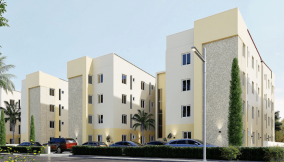Despite recording the second-largest share of real estate developments in 2022, about 60 percent of mall projects are on hold due to high construction costs, which has been made worse by rising inflation in Nigeria.
Other reasons for this are a shallow tenant pool arising from local currency devaluation and diminishing disposable income, which has reduced footfall at many malls.
For some months, the retail sub-sector has remained relatively subdued and, according to a new report on the performance of the various segments of the real estate sector, the momentum that began in 2021 was sustained throughout the year with a slow and steady return to construction and real estate activity.
The report, however, said that currency challenges and long-term trends such as the evolving landscape of consumer purchasing power in the retail sub-sectors continued to impact occupancy levels and achievable rents, especially in the grade A malls.
Events of the moment in the retail space tend to belie analysts’ perception and predictions on the sub-sector a few years ago when there was what could pass as a revolution, with both foreign and local investment interests growing on a daily basis then.
In 2014, for instance, Nigeria witnessed an unprecedented increase in the number of shopping malls in major cities like Lagos, Abuja, Port Harcourt and Aba.
Hakeem Oguniran, managing director of UPDC at the time, attributed the growth in the number of shopping malls in the cities to changes in lifestyle and urbanisation, which saw many people living in rural areas moving to the cities and acquiring new tastes with their new income levels.
Lagos and Abuja particularly saw a revolution in the sub-market that was driven by the country’s encouraging demographics, changing household shopping culture, strong purchasing power and high consumer spend coming from the upper and emerging middle-class population.
A joint venture by Shoprite and Stanbic IBTC as development partners and Resilient Africa – a real estate investment and development company from South Africa – planned to develop as many malls as it could in Nigeria.
This was because they believed that the potential of the Nigerian market was unlimited and it was relatively immature. “We see big international (European) retailers coming here in the next two to three years. I think Africa is the flavour of the moment and it is only natural for international investors to migrate to the continent,” Japie Swart, Resilient Africa’s chief operating officer at the time, told BusinessDay in an interview.
Swart disclosed that they were already tapping into the opportunities which the market offered with the development of Delta Mall, a retail outlet sitting on 14,000 square metres gross lettable area estimated to cost $58 million on completion.
Today, the subsector is singing a new song with many stalled projects that were planned to deliver Grade A formal shopping malls. Vacancy rates are also rising while footfall is shrinking on account of a slowing economy that has left individuals and households with low purchasing power.
Meanwhile, many community malls are springing up, existing and operating side-by-side with the big malls, which cannot afford the flexibility of service the former offers.
What is happening in the retail sector is not different from that of the commercial office space, which has also seen better days with investment interest coming mainly from local investors.
The report compiled by Estate Intel, an online property and research platform, said development activity in this sub-sector declined by 14 percent in 2022 compared to 2021 due to currency challenges and rising inflation.
“This sub-sector however, remains resilient in terms of occupancy rates despite pandemic headwinds and leasing activity still being driven by relocations,” said Tilda Mwai, insights lead at Estate Intel.
“The office market continues to exhibit varying levels of occupancy across different grades. The B- Grade segment appears to have the highest occupancy level at 78.36 percent, while the A and B+ grade segments have 71.35 per cent and 75.35 percent occupancy levels respectively,” Mwai added.
Read also: We expect Tinubu to establish construction bank for infrastructure fund – FOCI
She pointed out, however, that the A+ office market currently has an occupancy level of 54 per cent owing to the recent completion of Famfa Oil Tower on Kingsway Road, Ikoyi, Lagos, which has added 18,500 square metres of leasable A+ space into the market.
The report stated that the hotel sector also had one of the largest development streams, accounting for approximately 36 per cent of estimated total stock. It said the sector’s outlook remains positive and has emerged as one of the best-performing real estate sectors, with its recovery against 2019 outperforming key global hubs such as Dubai, London and Hong Kong.
Mwai said despite the volatility in the macro-economic environment, the real estate market has remained resilient with bright spots emerging across sectors such as residential and healthcare.
She added that rapid infrastructure development has also ushered in new opportunities for developers and investors in Lagos and its neighbouring states such as Ogun, which is fast closing its boundary with Lagos developments.
Join BusinessDay whatsapp Channel, to stay up to date
Open In Whatsapp





